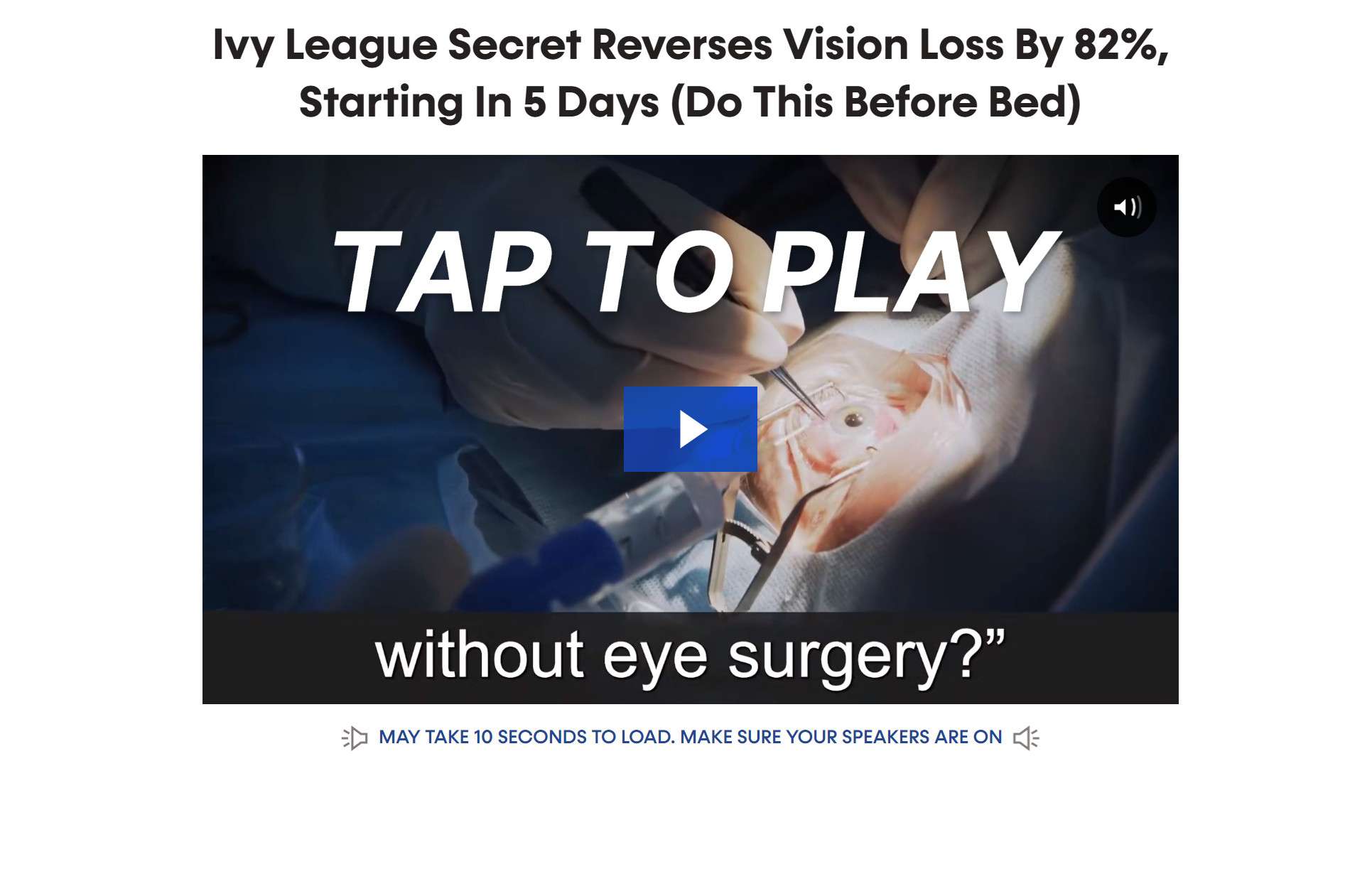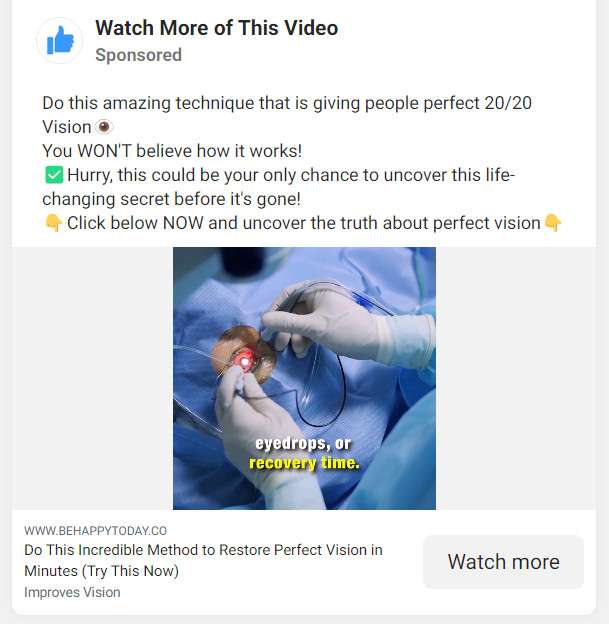Over the past few years, scammers have been using deepfake technology to create fake celebrity endorsements in order to promote various products and services. One recent example that has gained attention is a scam involving TV personality Dr. Phil and a vision supplement called Vision Hero.



Overview of the Dr. Phil Vision Hero Deepfake Scam
This scam operates by utilizing deepfake videos of Dr. Phil to make it appear as if he is endorsing and reviewing Vision Hero. The deepfakes are then used in ads on platforms like Facebook, TikTok, and YouTube.
The fake ads describe Vision Hero as a “100 percent natural solution to regain your perfect 20/20 vision” that can “overcome common eye conditions such as cataracts, glaucoma, myopia and blurry vision without the need for surgery, eyewear or eye exercises.”
When people click on these ads, they are redirected to a site called timeshealth.co which features a fake article claiming that a “leading Eye Specialist has just disclosed a breakthrough vision restoring method” in the form of Vision Hero.
The article on the timeshealth.co site claims that Vision Hero can “restore perfect sight” by allowing “your eyes to rejuvenate.” Over 110,000 people are said to have used Vision Hero to “regain their 20/20 vision.”
If people click through to watch the “eye-opening video” mentioned in the article, they are redirected again to a site called visionxreport.com. This site allows victims to purchase Vision Hero, describes it as an “Ivy League secret” that “reverses vision loss by 82%” and makes dubious claims about being clinically verified.
Breaking Down the Details of the Scam
Let’s break down the details of how this scam operates:
- Deepfake Videos: The ads feature deepfake videos of Dr. Phil that make it appear as if he is enthusiastically endorsing Vision Hero. The realistic nature of deepfakes allows the scammers to create fake reviews and testimonials.
- Misleading Health Claims: The ads and sites make misleading claims about Vision Hero’s ability to restore vision, treat eye conditions like cataracts and glaucoma, and “reverse vision loss.” These medical claims are not backed by scientific evidence.
- Celebrity Endorsement: By using Dr. Phil’s likeness and image without his consent, the scammers take advantage of his celebrity status to portray false credibility.
- Purchase Funnel: The ads redirect to multiple websites that utilize fake news, testimonials, imagery of the product, and calls to action to convince victims to purchase Vision Hero.
- No Evidence of Efficacy: Despite claiming clinical verification, there’s no evidence Vision Hero provides the benefits stated. The sites even include dubious disclaimers denying medical claims and intent to diagnose or treat any condition.
How the Vision Hero Deepfake Scam Works
Now that we’ve covered the overview, let’s explore exactly how this scam works from start to finish:
Step 1: Scammers Create Deepfake Celebrity Endorsements
The first step for the scammers is to produce deepfake videos featuring celebrity endorsements. Deepfakes leverage AI to combine and superimpose videos and images onto source footage.
In this case, the scammers used footage of Dr. Phil and altered it to make it appear as if he was enthusiastically reviewing and endorsing the benefits of a vision supplement called Vision Hero.
The deepfake footage matches Dr. Phil’s voice, mannerisms, and surroundings accurately enough to fool viewers into thinking the reviews and endorsements are real. The realistic nature of deepfakes allows the scammers to create a compelling false endorsement.
Step 2: Fake Ads Promote Vision Hero Using the Deepfakes
Next, the scammers created fake advertisements promoting Vision Hero that incorporated the deepfake videos. The ads portray the deepfakes as real endorsement videos from Dr. Phil.
The fake ads started appearing on social platforms like Facebook, TikTok, and YouTube. They were optimized for search visibility to target users interested in vision health, eyesight improvement, reversing vision loss naturally, and related topics.
The ads describe Vision Hero as a “natural solution” that can “regain 20/20 vision” and “overcome eye conditions like cataracts and glaucoma.” These medical claims take advantage of people desperately seeking vision restoration.
Step 3: Users Click Ads and are Redirected to Fake News Sites
When people click on the fake Vision Hero ads, they are redirected to timeshealth.co. This website features a fake news article further portraying Dr. Phil’s supposed endorsement.
The article utilizes more deepfake footage and claims an “Eye Specialist has just disclosed a breakthrough vision restoring method” in the form of Vision Hero. Quotes are attributed to this fictional expert.
The article states over 110,000 people have used Vision Hero to “regain their 20/20 vision.” These fabricated statistics and claims leverage the urgency of clicking while the offer is still available.
At the end of the article is a call-to-action to click and watch an “eye-opening video” about Vision Hero before it potentially gets taken down.
Step 4: Customers Get Redirected to Vision Hero Sales Page
When people click the call-to-action to watch the eye-opening Vision Hero video, they get redirected again to visionxreport.com. This site allows users to purchase Vision Hero.
The site utilizes more deepfakes, questionable health claims, fake imagery of the product, manufactured scarcity and urgency, and additional calls to action to convince visitors to buy Vision Hero.
They describe Vision Hero as an “Ivy League secret” that “reverses vision loss by 82%” and make more unproven assertions that it is “clinically verified.”
The site allows users to purchase Vision Hero, including discounted multi-bottle packages up to a 180-day supply. They also offer free shipping and a 180-day money back guarantee to overcome hesitations.
Step 5: Scammers Profit While Buyers Lose Money and Get No Results
Unfortunately, after buyers purchase Vision Hero by falling for the false claims and celebrity endorsements, they end up losing money and getting no results or benefits.
There is no evidence that Vision Hero provides the claimed vision restoration or treats medical eye conditions. The disclaimers on the site even deny making any medical claims or intent to diagnose or treat any health issues.
Meanwhile, the scammers profit from each sale while the victims are now stuck with a useless product. Even if buyers try to get a refund, the scammers likely planned for that in advance to avoid repercussions.
This demonstrates how elaborate and deceitful the deepfake scam ecosystem has become in leveraging fake celebrity endorsements to sell useless products and services.
What to Do If You Fall Victim to the Vision Hero Deepfake Scam
If you unfortunately already purchased Vision Hero from the fake ads and websites using the Dr. Phil deepfakes, here is what you should do:
Step 1: Stop Taking Vision Hero Immediately
First, stop taking Vision Hero right away. Since the product has not been approved by the FDA could potentially cause harm if consumed. Protect your health by ceasing use.
Step 2: Call Your Bank or Credit Card Company
Next, contact your bank or credit card company depending on how you paid for Vision Hero. Notify them that you believe you were the victim of fraud from an online purchase.
Explain the situation involving the use of deepfakes, false health claims, potentially unauthorized charges if cookies or other user data was compromised, failure to provide the marketed product or benefits, etc.
Step 3: Report the Scam Ad, Sites, and Merchant Accounts
Help protect others by reporting the scam ads, fake news sites, and any payment merchant accounts associated with the scammers.
On platforms like Facebook and YouTube, find and report the scam ads so they can be removed. Also report the timeshealth.co and visionxreport.com websites associated with the scam purchase funnel at ReportFraud.ftc.gov.
This helps get fraudulent ads, merchants, and accounts shut down much faster. Report details like the product, websites, identifying information, screenshots, who you spoke to, etc.
Step 4: Dispute the Credit Card Charge
If the charge is still listed as pending, contact your credit card company again and dispute it. Provide details on why the charge is illegitimate such as:
- You were the victim of fraud from an online purchase
- The product endorsements were fabricated using deepfake videos without consent
- The product does not provide the marketed health benefits
- The claims made were medically unsupported
- Your user data may have been compromised without authorization
Follow your credit card company’s dispute process by providing requested documentation like receipts, screenshots, records of who you contacted, etc.
Step 5: Leave Online Reviews to Warn Others
Leave detailed negative reviews about your experience being defrauded by the Vision Hero scam on third-party review sites. Outline specifics like the use of celebrity deepfakes, false medical claims, website redirection, being refused refunds, etc.
This helps prevent the scammers from claiming more victims. The more people learn about the deceptive tactics and failure to provide the marketed product, the less likely the scam continues succeeding.
Frequently Asked Questions About the Dr. Phil Vision Hero Scam
Wondering if those Vision Hero ads using Dr. Phil are real or a scam? Concerned the deepfakes mean your personal data might be at risk? Unsure where the products are actually shipped from? We answer the most common FAQ.
Are the Dr. Phil Vision Hero Reviews Real?
No. The Dr. Phil Vision Hero reviews are completely fabricated using deepfake technology. Dr. Phil has never endorsed or reviewed Vision Hero at any point.
The deepfake videos are created using AI to combine source footage with images of Dr. Phil to make it appear real. But it’s all fake without his agreement.
What Makes the Dr. Phil Vision Hero Ad a Scam?
Multiple deceptive tactics make this a definite scam:
- Fake celebrity endorsements via deepfakes without consent
- Misleading claims about vision restoration benefits
- No evidence Vision Hero treats medical conditions
- Redirects designed to hide affiliation
- Failure to ship products as marketed
- Refusal to provide refunds to dissatisfied buyers
These hallmarks of an online scam mean victims lose money while the scammers profit.
Why Use Dr. Phil Deepfakes in the Scam?
Dr. Phil is well-known from his popular daytime TV show for over 20 years. Scammers exploit his celebrity status and brand recognition to portray false credibility.
Using his likeness without consent via deepfakes tricks users into thinking he genuinely endorses Vision Hero. This convinces victims the medical claims must be valid if someone famous is staking their reputation on it.
What is the Best Way to Avoid These Type of Scams?
Use extreme caution before trusting any vision health solutions marketed online. Check for independent testing of ingredients from reputable eye health organizations.
Beware of supposed “breakthrough” cures, emotional appeals about reversing blindness or cataracts naturally, claims of hidden home remedies, or any promotion using fake celebrity endorsements.
Stay vigilant for signs of fraud like hearsay medical claims or logistical details like mysterious shipping origins. Protect yourself, your identity, and your wallet from further harm. And help prevent these criminal networks from claiming more victims using deepfakes by reporting suspect ads immediately.
The Bottom Line
In review, the Dr. Phil Vision Hero scam leverages realistic deepfake videos to promote a questionable vision “health” product using fake celebrity endorsements and false claims. The purchase funnel redirects victims through fake news pages riddled with more manipulated footage and debunked assertions about treating vision issues from an Ivy League secret formula.
There is no credible evidence Vision Hero restores vision, reverses vision loss, treats cataracts or glaucoma, or provides any other ocular benefits as extensively claimed.
The scam preys on desperate consumers seeking eyesight solutions by fabricating endorsements and reviews. The victims lose money while the scammers profit, only for buyers to end up with an ineffective product and no recourse.
This scam and other similar ones highlight the growing deception of deepfake technology and how celebrities are having their brand manipulated without consent. It underscores why we must be vigilant in questioning supposed endorsements, checking claims through objective third-party sources, and confirming a money-back return policy.



